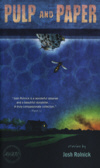Pulp and Paper
Josh Rolnick writes like a storyteller. He places his characters in the middle of complex situations, but doesn’t leave them stranded. Instead, he inhabits their psyches and builds compelling scenes for them to respond to trouble in the best way they know how, by lunging headlong into it. Meanwhile he creates scenes that rivet you to a sliver of time and the gloom of place, sweeping you up in the first sentences of his eight tales and setting you down at the end of each one with greater faith in the human race.
Josh Rolnick writes like a storyteller. He places his characters in the middle of complex situations, but doesn’t leave them stranded. Instead, he inhabits their psyches and builds compelling scenes for them to respond to trouble in the best way they know how, by lunging headlong into it. Meanwhile he creates scenes that rivet you to a sliver of time and the gloom of place, sweeping you up in the first sentences of his eight tales and setting you down at the end of each one with greater faith in the human race.
His prize-winning debut collection, Pulp and Paper, is rife with snarky narrators. An angry father, against his better judgment, finally confronts his grief when he agrees to meet with the cheerleader who killed his son. Two youths attempt to woo a couple of female out-of-towners on holiday at a seaside resort by dazzling them with smelly eels and fish guts with heart-breaking results. Small town tragedy brings a local burned-out newsman face to face with the limitations of his dying pride. And after three years of filling the niche of man around the house, a young boy attempts to sabotage his mother’s budding romance, employing imagination with a vengeance.
Normal people in difficult situations make gratifying choices in the final hour of discovery. And that’s just in New Jersey. The second half of the book, and four more stories, are located in New York.
In searching for the one thing that kept me reading for four hours without looking up, I discovered that there wasn’t just one thing, but the confluence of interesting plots, heart-rich interactions, and the odd humor of grave situations. Yet, the cream that kept rising to the top was in the striking descriptions that both skimmed the surface and reached for depth in the same string of sentences. I noticed a pattern. First, the observation. Next, a simple example followed by another or two. Then a strange twist, one that often verged on sarcasm, exposing the underlying struggle.
Here’s one from the opening story, “Funnyboy”:
For a while, there is genuine sympathy. People you don’t know come to your house with a tuna casserole. The phone rings so often you have to shut it off before you go to bed. You get crayon drawings from school children. One little Picasso sent us a picture of a stick bicycle, broken in two, with tears streaming form the handlebars.
And, another from “Innkeeping,” where each of the rooms in a dilapidated ocean-side guesthouse is named for a literary writer, and a boy eavesdrops on his mother’s date:
Silence. And this time the silence held. From the timbre of the wind in the duct, though, I knew that I was still getting clear reception from the Melville Room. At first, I thought maybe Tweedy [mom’s new boyfriend] was just tongue-tied. But as the quiet swelled, reality slapped me in the face like a renegade wave.
And here’s a favorite, from “Mainlanders,” a story that taken alone is worth paying full price for the book as two adolescents grapple with lip-glossed love. It goes like this:
We sucked in our stomachs, puffed up our chests, selected the biggest waves and rode them all the way into the sand crab zone, a skipped shell from their sun-kissed toes. And if they happened to look or god forbid smile–if they made even fleeting eye contact–our entire world opened up, and every other thing in our lives, good, bad, or ugly, sloughed away.
Train wrecks. Abortions. Unrequited love. Missed opportunities. Second chances.
One trouble after another, told with compassionate details that make a difference in keeping the reader reaching for what comes next, only to be left bereft when the last story is told. Not because the ending to this remarkable double quartet paled, but because after a full afternoon of reading masterful prose by a lake in the sun, the collection was done. Or, as our Rolnick’s carousel man points out in the final sentence, “as quickly as it had come to me, it was gone.”





